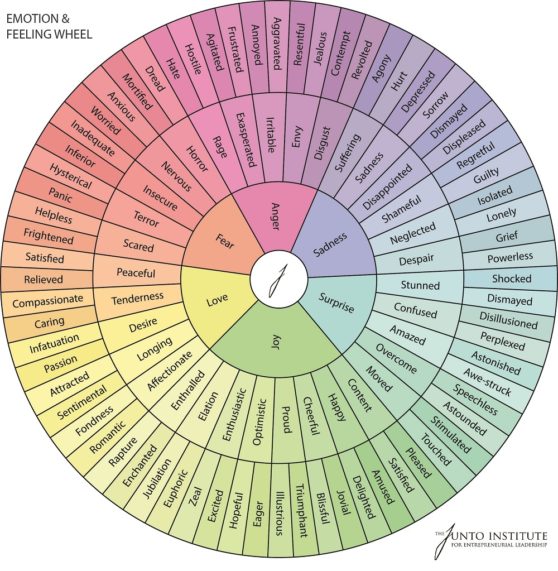A list of feelings, or is it a list of emotions?
In a previous post, I wrote about how we are developing up one of the projects from a previous VMH year.
That project draws on the principles of Cognitive Behaviour Therapy to create a card game that is both fun to play, but also stretches the players’ abilities to get in the minds of other people. We can see the game being a potential tool for psychologists to use in the clinic to illustrate some of the concepts of CBT.
As part of developing the game further, my role was to generate a list of ‘feelings’ that was comprehensive enough to cover a wide range of human experiences.
Turns out this is harder than it sounds.
Firstly there is a difference between ’emotions’ and ‘feelings’ although we tend to use the terms interchangeably. Put simply, emotions are more primitive and reflect basic drivers of behaviour, emerging from the more automatic, subconscious parts of our brains. The number of distinct emotions is generally considered to fairly small: happiness, sadness, disgust, fear, surprise, anger, pride, shame, excitement (although this is open to debate). Their purpose is to orient the organism (i.e. us) towards some broad behavioural routines. For example, anger primes us to fight. Fear primes us to flee.
Feelings are what happens when these emotions are filtered through all of our memories, beliefs, experiences, and conscious awareness. They number in the hundreds and reflect variations on each of the core emotions. It is feelings that we are more likely to be describing when relaying our experience to a friend or a therapist. We might not always be aware of the emotions underneath. This notion of more nuanced ‘feelings’ emerging from core emotions is quite well captured in this graphic from the Junto Institute.

Second, there is no real consensus on what constitutes a comprehensive list of feelings/emotions. There are multiple views on basic emotions and how to classify them. And any list of feelings/emotions that you find online is going to be organised differently, depending on the underlying model the person uses. No matter which list you look at, there is always the ‘feeling’ that something is missing. It is easy to find gaps in a list. For example, I find interest and curiousity and inquisitive missing from the wheel above.
Coming up with a list of feelings (or is it emotions?) for the game
When preparing a list of feelings/emotions for the card game, I knew I had to generate a list that was manageable – we can’t have 500 feeling words in the deck of cards!
But I also knew we had to have a list of experiences that was broad, capturing the variation in emotional experience that we all experience. Limiting it to a handful of core emotions wouldn’t achieve that because we don’t always (perhaps rarely) describe our experience in raw emotion terms. For example, I am more likely to say I am ‘frustrated’ than I am likely to say I am ‘angry’. We don’t always bring our feelings back to their core emotional routes. Furthermore, in a therapy situation, we want to encourage someone to expand their emotional/feeling vocabulary, so they can put a name to their experience.
So what I did was start with the core emotions identified in two recent studies –https://www.ncbi.nlm.nih.gov/pmc/articles/PMC4976910/ and https://www.pnas.org/content/114/38/E7900/tab-figures-data. The first of these suggested there were at least 27 distinct emotional categories. This was so I could at least get the core emotional experiences covered.
I then crosschecked the list against the various other emotion terms located on this page and added those emotions that didn’t seem to be appropriately covered by those in the original list. This was a very subjective process as each time I encountered a new emotion, I asked myself if I thought it was experientially different from those already on the list. I was drawing on my own experiences for this.
Then I returned to some of the other materials that had been developed for the game, namely the ‘scenario’ cards. The ‘scenario’ cards are a set of situations that the student group came up with that reflected the challenges and daily life of a tertiary student. I examined each scenario, put myself in the shoes of someone in that scenario and asked myself how I’d be feeling. I looked to see whether those feeling/emotion words were on the list.
The list as it currently stands I give you below. I warn you that a) it is totally likely that this list will be revised, b) you will quickly find a gap in the list and c) this is an unholy union of both emotions and feelings. However I do think that it is fairly comprehensive. Another possible trick I realised we could use in the card game is for a single card to contain multiple feeling words that are closely connected but still slighty different: annoyed/ irritable/ frustrated/ exasperated/ disgruntled/ miffed. I haven’t fully explored this possibility yet as only a few of the list have this multiple terms approach.
Anyway – see what you think. Does this list capture the emotional variety in your life? Or is it a sad indictment on the emotional immaturity of the man that put it together? What would you add to the list? What would you remove?
- Admiration/ liking/ impressed
- Adoration/ love/ affection
- Aesthetic appreciation/ in awe / wonder
- Aggressive
- Amused
- Angry/ mad/ pissed off/ hostile/ outraged
- Annoyed/ irritable/ frustrated/ exasperated/ disgruntled/ miffed/ resentful
- Apathetic
- Anxious/ worried/ panicked/ alarmed
- Ashamed
- Awkward
- Brooding
- Bored/ indifferent
- Calm/ chilled out/ relaxed/ serene
- Confused/ befuddled/ bewildered
- Confident
- Contemptuous/ disapproving
- Content
- Compassionate
- Courageous
- Craving/ wanting/ desirous/ longing
- Depressed
- Despairing/ tormented
- Determined
- Disappointed/ dismayed/ reproachful
- Disgust/ grossed out/ revulsion/ sickened
- Distressed
- Doubtful/ unsure/ cynical
- Dread
- Easy going/ carefree
- Embarrassed
- Empathic pain (empathy)
- Empty/ lost
- Enjoyment
- Enthusiastic
- Entranced/ enthralled
- Envious
- Excited
- Fear/ scared/ afraid
- Frivolous
- Grateful
- Grief-stricken/ heart-broken
- Guilty/ remorseful
- Happy/ cheerful
- Hateful/ vengeful
- Helpless
- Hopeful/ optimistic
- Horrified
- Humiliated
- Humble
- Hungry
- Hurt/ suffering
- Inspired
- Insulted
- Interested/ curious
- Jealous
- Joy/ elated/ jubilant/ delighted/ ecstatic / euphoric/ gleeful
- Like a fraud/ imposter
- Lonely
- Nauseous
- Neglected
- Nervous/ jittery/ reluctant
- Nostalgic/ sentimental
- Paranoid
- Pity
- Pleasure
- Powerless
- Pride
- Pressured/ coerced
- Rage
- Relieved
- Resentful
- Restless/ impatient
- Rejected
- Romantic
- Sad/ sorrow/ melancholy
- Satisfied
- Sexual desire/ lust/ passion
- Shocked/ disbelief
- Stressed / overwhelmed
- Surprised
- Suspicious
- Sympathy
- Terror
- Tired
- Trapped
- Triumph
- Trusting
- Upset
- Vulnerable

